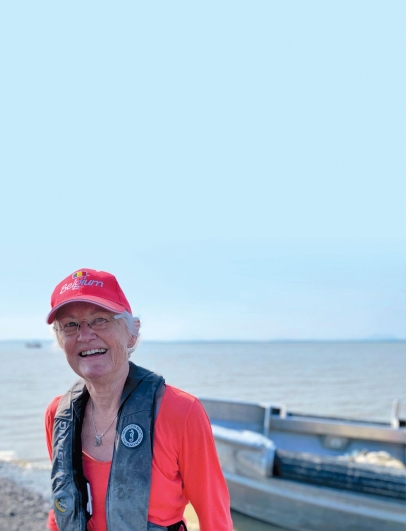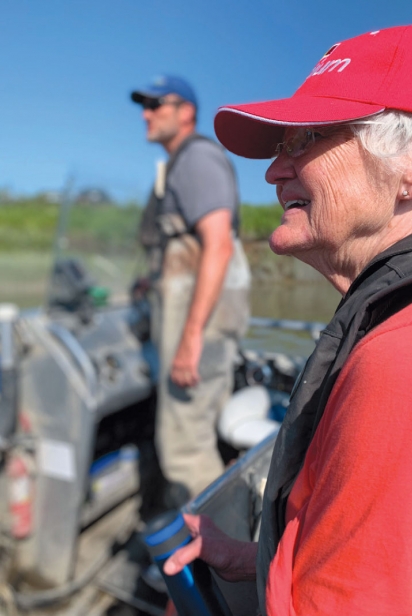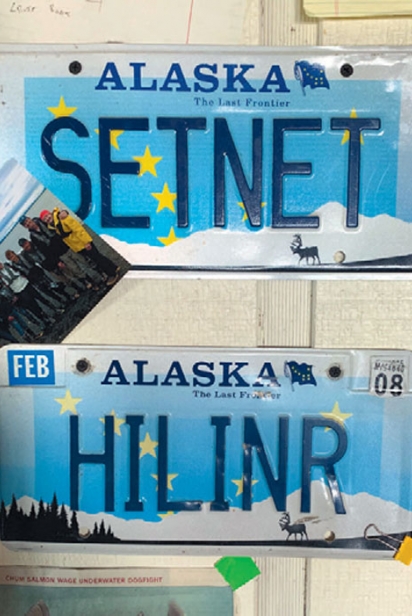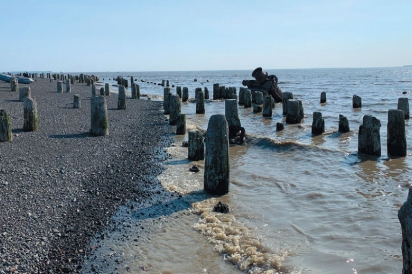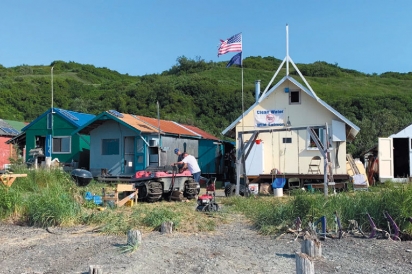Strings Attached
In Alaska, Everything’s Connected
Editors’ Note: This personal essay from writer Sarah Reynolds Westin shares her experiences at a fish camp during the 2019 fishing season. As we go to press, communities across Alaska including Bristol Bay are planning, evaluating, and cautiously moving forward to catch the fish that move toward their spawning grounds each year—pandemic or no.
Smoke rises from stretches of burning trees. A ventilation system filters out soot, but I taste it anyhow. Curls of ash weave through the sky, drifting north and covering the horizon in a haze.
“I don’t know if you’re lucky or missing out,” I say to Skookums, gesturing out the airplane window with my thumb. She invited me on this trip, and we swapped seats so I could see outside. She leans over to look, shaking her head.
We’ve known each other for seven years, since I adopted her grandson. We navigate the tricky waters of open adoption; my son and I are immersed in his biological family, hence the invitation to tag along to fish camp.
Most people know Skookums as a professional harpist. She hauls a stringed instrument whenever she travels, even to the remote cabin in Bristol Bay where we’re going. Skookums cooks on the beaches of Nushagak for the second half of the summer, relieving her daughter-in-law, Corinne, from a month-long stretch. The six meals served each day follow the dictates of the tides, and Skookums practices her fluid scales and rolling ballads whenever she gets a chance, serenading the fishermen along the bank.
Tom Rollman, Jr., Skookums’ son, has left a truck for us at the airport. We hoist our luggage into the bed and stuff the rest in the cab—coolers full of groceries, bins crammed with dry goods, and duffel bags stuffed with personal items. Perspiration sucks my shirt to my back. We load Skookums’ harp-shaped case last.
“Excuse me?” someone behind us says. The woman, wearing flip-flops and a striped T-shirt, continues, “Are you playing your harp out here?”
Skookums chortles, smiling. “I swear this happens at least once a day.”
I laugh, too, knowing in Alaska that no one’s gifted anonymity. What’s more, people, nature, and the elements connect in unexpected and intricate ways.
We drive to the docks, where Tom pulls up in a boat and greets us, pointing toward the sky, which glows brightly. The hot, dry summer is breaking records.
“It’s like this all the time,” Tom says. I almost believe him, but he catches the question on my face and clarifies. “Mom knows I’m kidding.”
Tom tracks the ebbs and flows of this place, whether monitoring the current or the temperatures. He’s got a good grasp on what is and isn’t normal, having fished these shores since the ’80s with his father, Tom, Sr. The permits and sites demand the attention. Like all commercial fishermen, be they drifters or setnetters, the catch depends on the elements.
Setnetters like Tom live on the beach. They fish when tides run, and drop wide, narrow nets into shallow waters. They turn their salmon over to floating tenders, and the Department of Fish and Game tracks the totals.
How much can be caught corresponds with escapement goals, which Fish and Game sets based on the number of fish that must make it up rivers to spawn, ensuring salmon remain available as Alaska’s most valuable renewable resource. In recent years, escapement has held steady, but now fish are flooding into Bristol Bay at a higher rate than expected. In 2017, 60 percent of the salmon were harvested and, in 2018, 73 percent were—resulting in two of the largest harvests ever.
Tom steers us away from the harbor. “We’re on a tight timeline,” he says. “Fish and Game opened the Wood for us today.” That’s a special-harvest area where Fish and Game is letting setnetters catch excess escapement.
As we skid across the water, I hold the brim of my hat, listening to Tom and Skookums chat about how the crews haven’t had to worry about storms this summer, which is odd and the only upside to not having rain. The salmon are behaving strangely, too. Warmer waters keep them in deeper trenches. They like the cold because it conserves their energy, explaining why setnetters are behind in their allotments, at no fault of their own. The fishermen also have to work harder to ensure their sustainability—or things need to turn around soon. No one knows whether these changes will have lasting effects on the quality and quantity of the salmon. By September, more than 100,000 salmon will die just in the Igushik because of warm-water stress.
Tom’s crews must stake out spots on the Wood River before the tides hit. He picks up the skiff’s speed. The wind makes it impossible to hear, pushing beads of sweat across my face. I close my eyes, breathe in the briny air, and imagine traversing this stretch in a storm, skies gray from rain-filled clouds and not smoke made iridescent by the orange sun.
The bay ripples like water in a tub and the mountains remain far off, as if we’re running in place. Tom moves toward shore, skirting a field where human-high grasses wave, and I notice a marooned boat. We cut back across the bay and idle into Nushagak. Ten cabins sit just above the high-tide line. Two are Tom’s. Two belong to his dad and his brother. Neighbors own the rest.
Brenna, Tom’s daughter, gives us hugs once we alight. Skookums dives right into work, inquiring about dinner plans.
“Let’s sort through the coolers,” Brenna responds, “and we’ll figure it out after.”
They pull cargo to the side of a cabin, hiding it in shade and packing in ice. The high temperatures have created an unexpected problem: keeping perishables chilled. The women move quickly to ensure items remain edible and encourage me to explore while they discuss the menu and sort supplies.
I mosey south, kicking at pebbles and waving back at people who nod, welcoming a new face, a rarity in this tiny community. A few folks ask some version of “who are you here with?” My response generates some version of “those are good people.”
I end up at a set of pilings that look like gravestones on the edge of town. I stop there, sitting, cross-legged, on a log washed up on the beach. Men trudge from a boat through a hundred yards of mudflats, each carrying two five-gallon buckets, their forearms bulging. Each step sucks their boots into the ground, and they twist their ankles to free their feet from the sticky grasp. They head my way, an indirect path from the catty-corner cabins.
“Geez,” one says, placing his bucket on the ground and putting his hands on his hips. “The things we do for ice.”
I chuckle, better understanding that sentiment. I don’t ask if their ice will resupply coolers or chill salmon, since they get paid more if their fish are below 38º Fahrenheit. We say goodbye, but I remain, picking through my thoughts about this place, particularly its magnitude and permanence. Somehow this awareness creates a sense of ephemerality, which stands juxtaposed to the concreteness of my desire for my son to work these shores someday.
These people. This land and sea. These fish and birds. This air and light. It’s trite, I know, but everything’s connected. I let that idea percolate a while.
The sun dips lower. I’ve been gone longer than I’d intended, and I traipse back.
When I arrive, one crew is sleeping; the other remains out fishing. Brenna and Skookums stand in the kitchen, chopping and mixing ingredients for breakfast and dinner, depending on which crew eats. I wander, studying ingredients and books, checking out photos and license plates tacked to the walls. Each detail speaks to the family’s larger story, and I memorize them for my son.
After everything is prepared, Skookums plays her harp on the porch. Brenna rests on the couch, fanning herself, feet propped up on the armrest, and I settle myself near her. She loosens her ponytail and rakes her fingers through her hair, tying it up in a knot.
“I’d come here to help my dad,” she says, “even if I didn’t get paid.”
Musical scales glide behind Brenna’s words, and I experience the sentience that comes when beauty, nature, and exhaustion blend.
The sleeping crew wakes to a silver sky. Stumbling to the table, they swig coffee while Skookums and Brenna scoop cottage cheese and canned peaches, hash browns, and sausage onto plates and wrap burritos to send for snacks. I want to ask questions, but they seem groggy.
Around midnight, the color of the sky resembles a deep bruise, and tracks in the sand look like someone scratched the earth. The first crew treks out to the skiffs left anchored by the second crew. Those coming off the water get to eat, but time passes before they huddle around the table. They’re much more talkative, and a realization settles in me. I like this place because it’s a family affair. We all belong. Acceptance permeates the atmosphere, like the comforting smell of dinner sizzling in pans.
“I miss pickles,” Joey, a deckhand, says, stabbing at a salad. “And chicken nuggets.”
Everyone laughs. Watching these young men makes imagining my son here in ten years easy. They banter and answer my questions. I want to know who they are and why they came.
“What the Rollmans have is special and specific,” another crewmember, Grizz, says, shoveling potatoes into his mouth and referencing the whole clan. “You’ve got your families—wives, kids, brothers—right next to each other. You can’t do that with any other type of fishing.” Tom, Sr., the pioneer of this operation, made it so his kids and their kids could be here today.
People clear their plates and clean their dishes, lumbering to bed in the center of a red ring that encircles the horizon.
The next morning, I stroll the beach again, determined to see a salmon—not that I haven’t elsewhere. I just trust here it’ll mean something more. The epitome of Alaska life. Wild. Intergenerational. Healthy. I stumble upon a neighbor gutting a sockeye at a makeshift table. He retrieves two flawless sacs of roe, slicing through translucent membrane, dripping eggs like rain into a jar. Maybe they could’ve made it to the headwaters. Maybe a bear would’ve eaten them. Maybe they should’ve hatched. Maybe. Maybe. Maybe. But right here’s where they are.
Back at the cabin, the radio announces that Fish and Game has closed the Wood River. Everything can change fast out here. Except a sense of satisfaction. It lingers.
Tom shrugs. “I guess the escapement slowed way down.” He seems neither perturbed nor concerned—his statement as simple as an acknowledgment that the heat will subside, like contentment exists when we accept how things are. His pause continues, but his affect is reassuring. “I love being out here. Fishing,” Tom says. “I remember being a kid, on this beach, thinking, This is really good. People are good. Fish are good. This is a good life.”


